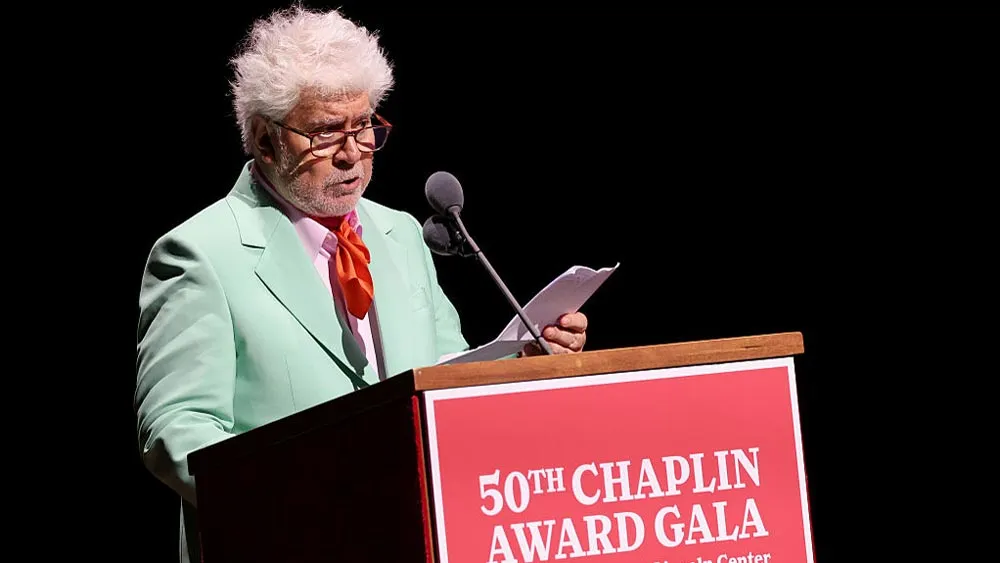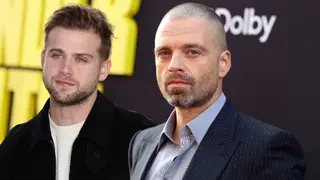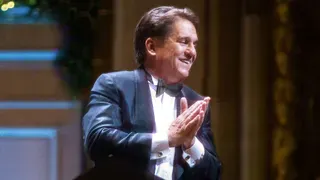November 20, 2023
EDGE Interview: Judy Kuhn on Making a Dark 1962 Musical Impactful for Today's Audience
Frank J. Avella READ TIME: 12 MIN.
Broadway legend Judy Kuhn is currently part of the Classic Stage Company presentation of a rare revival of the 1962 musical "I Can Get It For You Wholesale," running through December 17, 2023. The original production was most notable for introducing audiences to 19-year-old Barbra Streisand in the featured role of Miss Marmelstein. With a book by Jerome Weidman and music and lyrics by Harold Rome, the show received mixed reviews and ran for 300 performances. (The last major NYC revival was in 1991 at the American Jewish Theatre.)
Weidman's son John has revised the original book (and certain songs have been rearranged) for this version, including a new prologue that establishes the growing antisemitism of the time. Weidman has outstanding musical theater credentials, having written "Pacific Overtures" and "Assassins" with Stephen Sondheim, amongst other credits.
Set in the New York Garment District in 1937 this dark musical-comedy centers on Bronx-born Harry Bogen ("Tootsie" Tony-winner Santino Fontana) whose ravenous ambition to make it in the world has him doing some shady and illegal things.
Kuhn plays Harry's mother, a complicated woman who is wary about what her son is up to but conflicted on how to handle it. Kuhn deftly delves into the nuances of a woman who loves her son but also knows who he is and is frightened by what he's becoming.
Born in NYC, Kuhn made her Broadway debut as understudy to Betty Buckley in the Tony-winning musical, "The Mystery of Edwin Drood," in 1985. One year later she starred in the ill-fated but celebrated musical, "Rags," opposite Teresa Stratas, about a group of Jewish immigrants starting a new life in America. Less than a year after that, she originated the role of Cosette in the Broadway production of "Les Miserables," for which she received her first Tony nomination. Kuhn had the distinction of appearing in musical numbers from both shows on the 1987 Tony broadcast.
Lore has it that the great British stage director Trevor Nunn was in that Tony audience and was so impressed he cast Kuhn in his next show, the Broadway transfer of the Andersson/Ulvaeus/Rice musical, "Chess." A hit in London, the Broadway budget would not allow a replication and Nunn had a complete overhaul in mind for "Chess" beginning with casting. Kuhn was joined by rising star David Carroll who had appeared in a handful of previous Broadway shows including, "Seven Brides for Seven Brothers," opposite Debby Boone, and "The Wind in the Willows," with Nathan Lane. The show had its share of troubles, including a grandiose set that did not want to move–much like "Titanic," years later–but the production dared to push musical theater boundaries and surprise audiences with a rather devastating but cathartic ending (at least in previews).
She played Florence, a Hungarian-American who falls in love with Anatoly (Carroll), a brilliant Soviet Chess player who wants to defect. The demands on Kuhn were overwhelming. But she proved her mettle and received her second Tony nomination.
Unfortunately, New York Times critic Frank Rich, known back then as "The Butcher of Broadway," wrote a scathing review (really, a takedown) and the show closed prematurely, despite having a solid advance in ticket sales.
The thesp then journeyed to London and made her west End debut in the musical "Metropolis," which did not last very long, but she received an Olivier Award nomination for her performance.
In 1992 she appeared in the play "Two Shakespearian Actors" and in 1993 starred in the Roundabout Theater Company's revival of "She Loves Me," which nabbed her a third Tony nomination.
In the 1990s, Kuhn portrayed Betty Schaefer in the US premiere production of Webber's "Sunset Boulevard," in Los Angeles and Laura in the McCarter Theatre revival of "The Glass Menagerie."
The new millennium saw her take on Fanny Brice in the Actor's Fund benefit concert version of "Funny Girl" as well as her Olivier-nominated turn as Golde in "Fiddler on the Roof," in London (also directed by Nunn). And she took on two major Sondheim roles at Classic Stage Company: Fosca in "Passion" (which she also played at the Kennedy Center) and, more recently, Sara Jane Moore in "Assassins."
In 2013 she was part of the ensemble that brought to life the groundbreaking queer-positive Jeanine Tesori/Lisa Kron musical, "Fun Home," bringing Kuhn her 4th Tony nomination.
The actor/singer/activist has done some TV and film ("Tick...Tick, Boom!," "Enchanted"), but she feels most at home on stage.
EDGE recently had the pleasure of Zoom chatting with Kuhn about "Wholesale" and some career highlights.
EDGE: The show is extremely powerful. It's a scary time in the world. And the show is more relevant than ever. Can you speak a little bit about that?
Judy Kuhn: Oh, gosh, I can say a lot about it. But I think just starting with the work that our esteemed reviser John Weidman did on his father's book...( Jerome Weidman's) son, John, who's written many things, including three shows with Stephen Sondheim has revised his father's book of the musical bringing more of the darkness and the seriousness of the novel back into the show, trying to give the story more of what he thinks his father's real intention was with the story.
Between his work and our wonderful director ,Trip Cullman, what they've done is they've taken 1937, where the story is set and 1962, when the music and the show were written, and really brought it to 2023. And made it modern, which I think is why it's having such an impact. People aren't just sitting back and watching a revival. They're engaged with material that feels very relevant. And I think, especially, as you say, given recent world events, the Jewish content, and the exploration of Jewish values versus capitalist values, are relevant. And also, what happens to people, Jewish or not, when they're caged, and when their options are limited because of bigotry--the bigotry that comes with when a dominant culture decides that minority culture is not really welcome. And I think that those themes are even more relevant now than they were a month ago. For obvious reasons.
EDGE: What drew you to want to play Mrs. Bogen?
Judy Kuhn: I make choices about what I want to do, based on many things. Obviously, the quality of the material is one of them, also the people who are involved in it, and I adore John Weidman. I had the great good fortune of doing "Assassins," which is just a brilliant piece of writing. People think of it as a Stephen Sondheim show, but it's really a John Weidman show... with Stephen Sondheim songs. I just think his writing is brilliant in it. So, John, and Trip, who's a director I love and much admire, and I really wanted to work with him. And, of course, it's an incredible cast so just to be in a room with all those people, that to me why I do what I do. But also, the character is fascinating. She's very complicated. She enables her son, Harry Bogen, who is the central character, the antihero... and she also understands that he doesn't always make the right choices... until she realizes that he's gone too far... I'm a mother myself... and I can't imagine being a mother of a person who you feel like you might have to warn people against...
EDGE: I love how flawed (the characters are). But one of things I always admired about you... you were fearless from the get-go. I'm talking specifically about "Chess" and Florence... people called her unlikable. She was complicated. I feel that what you did in that show--and what Trevor Nunn did... pushing musical theater boundaries, with cinematic style... Looking back at that experience now, what are your thoughts?
Judy Kuhn: Oh, well, if you want to talk about likability, in terms of the character, I never think about whether a character is likable. I just think about who they are and what makes them tick, and why they do the things they do and what motivates them... I guess some of us make choices in life that are based on whether other people will like it or not, but not everything we do is because we want to be liked. We do things for all different complicated reasons. And that's what's interesting to me.
It was complicated, that show. What you refer to as that cinematic style was really, and for people that didn't see it, there were all these towers on a turntable, and they turned and Trevor's concept, along with the late great Robin Wagner was that there should never be blackouts and a scene change, that things should flow from one thing to another... And it was kind of genius, but it just didn't always work very well. And we spent too much time trying to make the set work rather than working on the show itself... It was pretty cool, though, when it worked, it really was cool...
That show was an incredible experience for me. It was my first real leading role in a show where I really had so much of it on my shoulders and it was a huge challenge in so many ways and you know, huge part, a complicated character--a very big, long journey and I learned so much from it.
EDGE: I need to ask you about working with the great David Carroll... And what was going on at the time, the decimation of a generation...
Judy Kuhn: Absolutely. David was incredible... He was one of a kind. As an artist, he was that rare leading man who was incredibly handsome, a really good actor. One of the most beautiful voices ever to grace the stage. And he had no ego, no vanity. He was really irreverent and hilarious. He used to make me laugh all the time. And just the loveliest person you ever wanted to meet or work with. Falling in love with him every night was an easy task. And I just really, really loved him.
I guess he was sick when we were working. But nobody knew. I mean, he knew he had AIDS. He didn't show signs of it then. He seemed perfectly healthy. It wasn't until his next show, "Grand Hotel," that he started to show signs of the disease. And, of course, he died while they were making that cast album. He was incredibly brave... I've never known anyone like him... He's one of those many people, artists who, God, I wish we could have seen what he would have done down the line, because I know there would have been so many great, great performances, And great deeds. He was an incredibly generous person.
One of the last things I did with him was when he could hardly walk. I mean, he was using a cane to walk. He organized a concert... raising money for a shelter that he had volunteered for. And he got all his mostly women friends, who he admired, to come and sing a song. And at the end, he came out {with} a cane and he sat in the chair, and he sang. (tears up) It was such a beautiful, generous act. He was incredible... He will always be in my heart.
EDGE: You were also part of the queer positive show, "Fun Home."
Judy Kuhn: Yes, I was. I was involved from the very early stages of its development, so many readings, labs, workshops, you know, et cetera. And then a production downtown and a production uptown with a lab in between. It was an extraordinary journey, artistically, personally... It was an extraordinary group of creators, one of the most collaborative teams of writer, director, designers I've ever worked with. Everyone was interested in everyone's ideas. Nobody felt precious about their particular territory.
I think the show is a work of art. I also like to be socially active and engaged. And it really brought together the theater and activism. I feel like we change people's lives and attitudes in a way that was life changing for some people. And that, to me, is what theater should be and if you get a chance to be a part of that, what's better?
EDGE: I'd be remiss, if I didn't ask you about playing Fosca (in "Passion") I know you did it twice, at the Kennedy Center, then at CSC. You brought a poignancy to that character that I did not see earlier. What was it (like) crawling into the skin of a character like that?
Judy Kuhn: Well, first of all, I think that is a masterpiece of music theater writing and storytelling. I feel like Fosca is someone who's been misunderstood... I went back and read the novel that the film was based on. I guess the show was based a little bit more on the film--you'd have to ask James Lapine about that–but she's not described as ugly or witchy at all. She's described as being very ill. And, in fact, And Giorgio says, at one point, she that she had beautiful eyes, and he could imagine that she was once beautiful. She also had a great intellect. And it led me to think about how, at that time in Italy, women who weren't necessarily the ideal of beauty, how they were treated and looked upon by the society in general.
I also read about depression and what they would call melancholy or hysteria, at that time... I read a lot about the physical symptoms of depression. And I thought, this woman isn't really crazy. She's treated as if she's crazy. She's deeply depressed. She's deeply lonely. She has an obsessive personality, but partly because there isn't anyone who she can relate to or who can relate to her... She lives on this military base. She has no companionship. And she sees this soldier who is incredibly handsome, and who she feels a kinship with... And yes, she becomes obsessed with him, and she behaves in a way that a lot of people would find very distasteful. But I feel, also, there's something we can all relate to, in that. Again, it's like, is she likable? Probably not. But that wasn't what was interesting to me. What was interesting is why she does what she does. She explains it by the end of the show when she sings "Loving You." She's someone who would die for someone she loved. Love is her reason for being.
"I Can Get It For You Wholesale" is performing at Classic Stage Company in NYC and has been extended through December 17.
Watch this reel of performances by Judy Kuhn:
Frank J. Avella is a proud EDGE and Awards Daily contributor. He serves as the GALECA Industry Liaison and is a Member of the New York Film Critics Online. His award-winning short film, FIG JAM, has shown in Festivals worldwide (figjamfilm.com). Frank's screenplays have won numerous awards in 17 countries. Recently produced plays include LURED & VATICAL FALLS, both O'Neill semifinalists. He is currently working on a highly personal project, FROCI, about the queer Italian/Italian-American experience. He is a proud member of the Dramatists Guild. https://filmfreeway.com/FrankAvella https://muckrack.com/fjaklute







